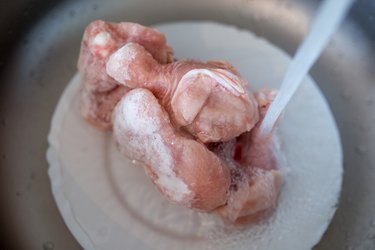
If you're wondering how to go about marinating frozen chicken, here's what you need to know. Just follow these steps and food safety recommendations and you should be all set. There's also a frozen chicken marinade recipe that you can try if you're in the mood for something different.
Read more: Is Chicken High in Cholesterol?
Video of the Day
Video of the Day
Marinades: The What and How
The USDA Food Safety and Inspection Service (USDA FSIS) explains that a marinade is a savory, acidic sauce in which you can soak meat in order to give it flavor, as well to tenderize it.
Marinades usually consist of some combination of cooking oil, one or more acidic ingredients (like wine, vinegar or lemon juice) and herbs and spices. As the meat sits in the marinade, the oil and the acid help it soak up the flavors from the herbs and spices.
The acid in the marinade also causes the tissues in the poultry to break down, thereby tenderizing it. Breaking down the tissue in the meat also helps it absorb more liquid, making it juicier. Watch out though, because using too much acid in the marinade can have the opposite effect, making the meat stringy and tough.
The University of Illinois Extension notes that while marinating meat tenderizes it and adds flavor, it does not kill harmful bacteria, so it's important to follow food safety recommendations to make sure your meat is safe to consume.
Marinating Frozen Chicken: Safety Recommendations
People tend to leave meat out on the counter while thawing it or marinating it; however, that can be dangerous. The U.S. Department of Health & Human Services explains that harmful bacteria that cause food poisoning to thrive in the danger zone between 40 and 140 degrees Fahrenheit.
The USDA FSIS therefore recommends thawing the chicken either in the refrigerator, in the microwave or under cold water, but never out on the counter. Since you'll also be marinating the frozen chicken, the fridge is the safest bet. The USDA recommends planning ahead because thawing chicken in the refrigerator can take time. A 1-pound package of boneless chicken breasts should take about an hour to thaw.
However, if you don't have time for thawing and marinating before you bake the frozen chicken breasts, you can bake the frozen chicken breasts directly and add spices, herbs, a drizzle of oil and an acidic ingredient to the baking pan to flavor the chicken. The USDA states that it is safe to bake the frozen chicken breasts without thawing them; however, the cooking time could be up to 50 percent longer.
Read more: How to Bake a Plain Chicken Breast
Frozen Chicken Marinade Recipe
If you're looking for a frozen chicken marinade recipe, LIVESTRONG.com lists a recipe for a fresh mango marinade that you can try. Tart, sweet, salty and spicy, it adds both flavor and nutrition to your meal.
You will need:
- 1 fresh mango
- 1 tablespoon of organic canola oil
- 2 tablespoons of orange juice
- 2 teaspoons of ginger root
- 2 teaspoons of brown sugar
- 2 cloves of garlic
- ¾ teaspoon of fine sea salt
- ¼ teaspoon of red pepper flakes
Here's what you need to do:
- Prep the ingredients: Peel the mango, remove the pit and chop the pulp into large pieces. Peel the ginger root and chop it finely. Mince the garlic cloves.
- Blend everything together: Put all the ingredients into the blender and blend them into a fine puree.
- Marinate the chicken: Apply the mixture to the chicken breasts and let them marinate for a minimum of two hours, in the fridge. According to the USDA, poultry can be marinated in the fridge for up to two days.
According to LIVESTRONG.com, this recipe works for up to 2 pounds of meat and contains 60 grams of carbs, 15 grams of fat and 2 grams of protein. It complements the chicken well, since chicken is a good source of protein and does not have a significant amount of carbs, per the USDA.
Read more: General Nutritional Facts About Chicken
- USDA Food Safety and Inspection Service: “Poultry: Basting, Brining, and Marinating”
- University of Illinois Extension: “Marinating Meat”
- U.S. Department of Health & Human Services: “4 Steps to Food Safety”
- USDA Food Safety and Inspection Service: “Chicken From Farm to Table”
- USDA FoodData Central: “Chicken Breast”